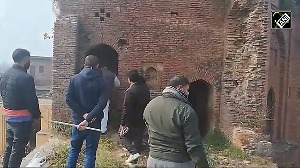A week after the terror attacks, fishermen in south Mumbai are yet to come to terms that terrorists took the sea route to the city and feel adequate patrolling may have alerted security agencies.
"Normally, there would have been 20 to 30 people by the seaside in the night, but on November 26, due to the cricket match, there were only two persons sitting," Ramesh Meher, a resident of the Fishermen's Colony in the Cuffe Parade area said.
They were sitting on the small patch of sand in the colony, a spot where the fishermen usually unload their catch, when the terrorists travelling on a rubber dinghy powered by a high-power engine landed.
"One of them asked the group what they were doing but the terrorists just brushed him off asking not to bother them," Meher said.
Eight of them then got out of the boat and loaded heavy rucksacks on their back while the other two took the boat and landed near Oberoi hotel in Nariman Point, he said.
The boat was later recovered by members from the fishermen's colony along with lifejackets and other materials.
The colony houses hundreds of families of the Koli community, who constitute the traditional fisherfolk.
"This is the first time that I can remember such a craft landing here and the boat was powered by a brand new powerful engine. From the oil found on the boat we estimated it must have travelled for about 10 minutes from sea," Parshuram Meher, another resident of the colony said.
"Had there been more people sitting on the beach we would have definitely opposed them and even might have caught them, but unfortunately that did not happen," he said.
Over 180 people were killed and more than 300 injured in the audacious strikes.
The local fishermen also said the patrolling carried out in the area was inadequate and often not present at all.
"The patrol boats are too slow to catch a boat of this size travelling at such a high speed and the boats are rarely found at the right position," Parshuram said.
Following the terror attack a meeting was organised among fishermen, navy and Coast Guard officials where measures to prevent such incidents in the future were discussed.
"The checking on fishing trawlers has increased significantly since the attack but there is an element of fear when we sail out since the ship used to bring in the dinghy was a hijacked fishing vessel," said Harshwardhan Tandel, another fisherman.
The community also raised objections to the navy's suggestion that after every three days of sailing they should return to the shore and report if any fisherman was missing.
"For the amount we spend on diesel and ice it is not possible to just sail for three days and return to shore. The security agencies need to realise our compulsions as well," Meher said.






 © 2025 Rediff.com -
© 2025 Rediff.com -